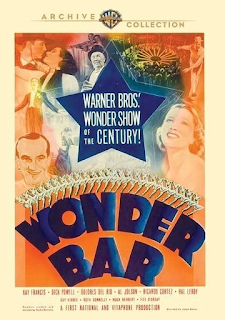(1934)
Directed by Lloyd Bacon
Written by Earl Baldwin, from a play by Geza Herczeg, Karl Farkas, and Robert Katscher
Starring Al Jolson, Kay Francis, Dolores Del Rio, Ricardo Cortez, Dick Powell, Guy Kibbee, Hugh Herbert, Ruth Donnelly, Louise Fazenda, Robert Barrat
IMDb Entry
Pre-code movies had exceptional freedom that vanished for over 30 years, but sometimes freedom can be problematic in the extreme. Despite its cast, and choreography by the great Busby Berkeley, Wonder Bar is not often shown -- and for good reason.
The movie is set in the Wonder Bar in Paris, run by Al Wonder (Al Jolson) and revolves around pairs of lovers. Al has a crush on Inez (Dolores del Reo), a featured dancer, who has an unrequited crush on her partner Harry (Richardo Cortez). Harry is in love with the married Liane Renard (Kay Francis). Captain Hugo Von Ferring is also at the bar, having one last fling before committing suicide after he lost all his money. There is also a comic subplot of Corby Pratt (Hugh Herbert) from Schenectady, who is visiting Paris with his wife Pansy (Louise Fazenda) and their friends Henry Simpson (Guy Kibbee) and Ella (Ruth Donnelly).*
The movie nicely intertwines the stories, with Wonder acting as master of ceremonies, and Tommy (Dick Powell) the featured singer of Busby Berkeley classic choreography of Harry Warren and Al Dubin's "Don't Say Goodnight."
But there's another Busby Berkeley song that you rarely hear or see. When I watched it, my reaction was similar to the audience in The Producers when they first saw "Springtime for Hitler." It's appalling.
The song is "Going to Heaven on a Mule." Now, it's not surprising that Jolson is doing a blackface number -- he was famous for it. In this one, he sings about heaven. And heaven is portrayed with just about every offensive racial stereotype imaginable.**
I'm surprised it flew even back in 1934. And it would be difficult to cut it out, since it's the big finish number of the movie. I'm guessing it's just too much of an embarrassment, so the movie was rarely replayed on TV.
The movie makes light of suicide, too -- something not uncommon of the era. It also lets someone get away with murder and portrays a version of the Apache dance,*** only with a whip(!),
There are other things that do show that pre-code had its advantages. One well-reported scene is when a man asks to cut in with a dancing couple, but chooses the man instead of the woman, with Jolson quipping, "Boys will be boys." Mrs. Simpson and Mrs. Pratt let themselves be seduced by gigolos and their husbands hook up with chorus girls,**** There are also sly bawdy references sprinkled throughout.
This isn't a movie I could recommend, but if you want to see just how awful things could be, it's a prime example.
___________________________________________________________________________
*Which comes up with a hilarious bit of geographical nonsense if you know the Schenectady area. When first seeing the Wonder Bar, she says, "This place doesn't compare to the Bijou Theater in West Schenectady." Of course, this is there to show how provincial the two couples are, but there is no West Schenectady. The area to the immediate west of the city center is the GE plant. Oddly, the South Schenectady Fire Department is west of the city.
**There's even a hint of antisemitism as a bonus.
***There was an inexplicable fad for these in the 20s and 30s (and beyond -- it even shows up on The Muppet Show, on the insistence of guest star Rita Moreno), where a man would toss around and slap his dance partner.
***If that's what they're really supposed to be.

No comments:
Post a Comment